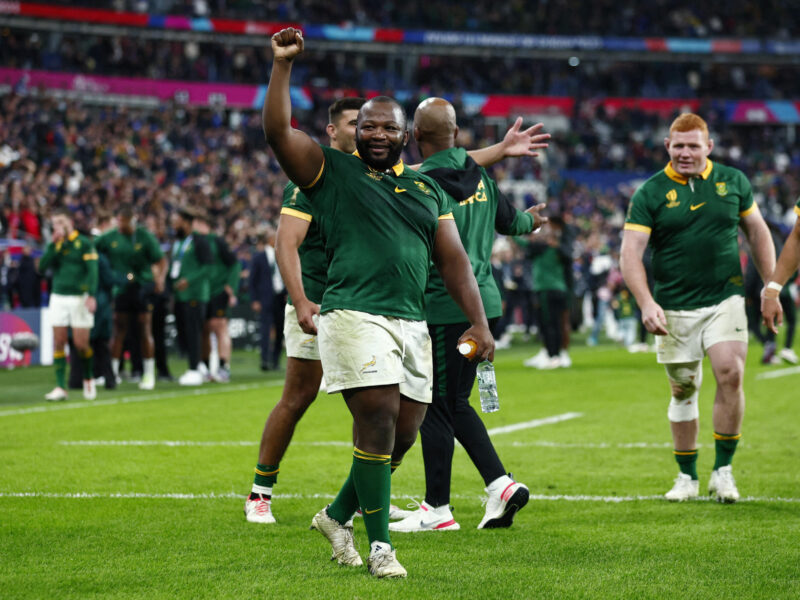[ad_1]
Three-time Rugby World Cup winners South Africa and New Zealand both have the opportunity to claim their fourth title on Saturday at the Stade de France in Saint-Denis, a suburb just outside Paris. It’s a fated matchup between two long-standing rivals from the Southern Hemisphere, each with different trajectories in the 2023 competition.
Issued on:
4 min
South Africa’s mythologised “bomb squad” will be unleashed once again in their World Cup final against New Zealand on Saturday. The squad, made up of specifically selected replacements, earned its moniker because of its ability to change the game’s trajectory or strengthen the Springboks’ grip on their opponents.
The brains behind the bomb squad, South African Director of Rugby Rassie Erasmus, was quick to draw on his secret weapon in the quarter-final match against France. The squad started to take to the field in the 45th minute. It didn’t take long for them to influence the course of the match. Prop forward Ox Nche came on in the 51st minute and played an essential role in the scrums. The situation repeated itself a week later in the semi-final against England.

Eager to assert their physical dominance in the final, the Springboks have swapped in second-rower Jean Kleyn and back-rower Jasper Wiese to their eight replacements. In total, seven forwards will be on the bench, including prop forward Trevor Nyakane, who makes his return to the squad. The one back on the bench, the versatile Willie Le Roux, is capable of playing multiple positions if required.
These choices reflect the reigning world champion’s desire to dominate the scrums and rucks and deprive the All Blacks of attacking opportunities.
This strategy has already proven successful, as they handed the New Zealand team its heaviest-ever defeat on August 25 in London, beating the All Blacks 35-7. The All Blacks, reduced to 14 men in the 39th minute after Scott Barrett was sent off with a red card, were unable to stem the tide of the South African forwards, who scored four tries.
All Blacks return to form
The rout is bound to raise fears – or strike terror – among the All Blacks as they face their arch-enemies in the World Cup final.
“It’s the biggest rivalry in New Zealand rugby,” says Ian Borthwick, a New Zealand-born rugby journalist and specialist for FRANCE 24. “The Springboks are the team with the highest win rate against the men in black.”
The South Africans have won 10 matches and drawn one in their last 33 encounters against the All Blacks. By comparison, Australia, which also frequently faces New Zealand, has won four times and drawn three in as many meetings.
Facing a South African team that has never lost a final, the All Blacks must build upon the impressive progress made throughout this World Cup. Since losing the tournament opener to France 13-27, certain key players have returned to the squad from injury and New Zealand have found their stride in the knockout stage. They dispatched an impressive Ireland squad in a tough quarter-final and eliminated Argentina without trouble last Friday.
“The All Blacks weren’t in top form when they started this World Cup, while the Springboks were already at their peak,” says Borthwick. “They went through tough periods, but they want to show that they are still an essential force in world rugby.”
To challenge the Springboks, the All Blacks have opted for a more traditional bench with five forwards and three backs. Their strategy remains the same, relying on their technical qualities to outpace a South African team worn out by successive one-point victories.
With both teams being three-time world champions, the match is an opportunity to establish supremacy. Borthwick says we should expect a classic between “the traditional heavyweights of world rugby”.
A dream match
The two sides haven’t faced each other in a World Cup final since the controversial 15-12 Springbok victory in 1995. Awarded the hosting rights three years after the end of apartheid, South Africa defied all expectations by reaching the final. The All Blacks, who were the clear favourites, suffered severe food poisoning two days before the match. The subject remains contentious in both countries.

“Even though there was talk of food poisoning and the like from the All Blacks side, it has not diminished what that Springbok team achieved in very difficult circumstances,” says Dylan Jack, a journalist for SA Rugby magazine, who thinks a dream final is shaping up between the two teams. “Springbok fans love nothing more than a win against the old rivals and it has been nearly 30 years since the two teams have faced each other in a World Cup final.”
He believes that one of the strengths of this South African team is its unchanged core since winning the 2019 World Cup against England in Japan. Ten Springboks who won in Yokohama will take to the field Saturday evening. This experience will be valuable for a match that promises to be very tight, says Jack.
The All Blacks, who last won eight years ago, will be looking to shine in the city of light. If they can pull it off, veteran warrior Sam Whitelock, who lifted the Webb Ellis Cup in 2011 and 2015, will become the first player to have three World Cups on his proverbial mantlepiece.
This article is translated from the original in French.

